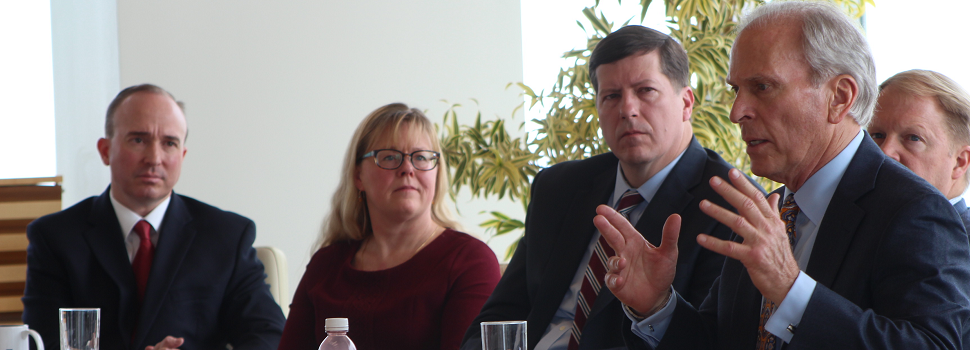
Salt Lake City—The backbone of this country lies in its integrity and the respect of rule of law. While our system is not a perfect one, that culture is what makes other countries not only respect us, but also makes some want to learn from us. Those opinions were stated in a discussion Tuesday morning with nearly 25 legal veterans and professionals from across the state at the annual Utah Business legal roundtable.
The question was a rather philosophical one for the roundtable, which generally discusses topics in the industry such as digital privacy, how legal services are changing, the importance of pro bono work, etc. But with daily headlines seeming to show a country in turmoil, it was a question that “subsumes everything else,” said Richard Burbidge, managing partner at Burbidge | Mitchell.
“There’s a saying that if you have integrity, nothing else matters, and if you don’t have integrity, nothing else matters,” said Burbidge. “That applies to your governmental systems in the distribution of justice. The thing to understand is that it’s culture. We have a culture of democracy. It’s being attacked, but we have a culture of democracy respect of the rule of law.”
The average American’s faith in the judiciary system has been dropping, said Dickson Burton, managing shareholder at TaskBritt, P.C. Thankfully, Utah’s metrics are higher than “almost anywhere,” said Burton, but lawyers still need to be vigilant about educating the public on the way the legal system works—and that it actually does work.
“As attorneys, we need to be advocates, not just for our clients, but for the system. We can do that in public. We can do that with our clients,” he said. “Another point to make—those of us in this room, we represent the top 10 percent of society, the individuals and businesses that can hire us. It’s the 90 percent that can’t afford lawyers, usually, that maybe are most important when it comes to trusting the process and the judiciary. We can advocate for that group, too, and help educate them and help represent them as needed.”
That current turmoil and lack of faith in the system is creating “a stress test for our democracy,” continued Justin Toth, VP/shareholder for Ray Quinney & Nebeker.
“We are watching a stress test for the rule of law. What can we do to protect it? We may not be able to affect exactly what’s going on in Washington or anywhere else in the world, but you can affect what goes on in your own environment, in your own cases, and in your own relationships,” he said. “To me, what we do is we remember that facts matter. They matter in our cases. We don’t exaggerate facts. We don’t mislead. We honor the facts. Rules matter. Fair play matters.”
Just as culture can make or break a business, our collective culture in respecting the rule of law is what makes America great, said Burbidge. “Culture is precious. It’s all that separates us. It can be lost. It’s generated over centuries and it can be lost in an instant of chaos—that’s a warning to us all. We’ve got to protect the referees. We’ve got to protect the rules and the referees.”
Utah Attorney General Sean Reyes said that culture is often overlooked or taken for granted in the United States, but it is not so in other countries who look to ours as a guiding light. Reyes said the state has worked with other countries, such as Mexico and Haiti, to help them understand the American judicial system and help transition into an adversarial system in their own countries.
“We just spent the last 10 years trying to help the Mexican government transition from an inquisitorial system to an adversarial system,” said Reyes. “… They said, ‘How long is it going to take for the people to have confidence in this system?’ because one of the reasons they’re changing is they believe their current system has lead to a lot of opportunities for corruption. We said ‘You can have the system and you can understand it academically, but it’s going to take a while for the culture of the people and the culture of the Bar to actually internalize these principles and abide by them.’ … We have dozens of countries coming to Utah to train on things like human trafficking or cybercrimes. One of their favorite topics is on rule of law, democracy, and public corruption and the interplay of those. We really are, whether we realize it or not, for those countries, at least an ideal, a bright light that they’re aspiring to. I think we take it for granted a lot.”
The conversation was moderated by Angelina Tsu, VP and legal counsel for Zions Bancorporation. The full discussion was posted in the June 2018 issue of Utah Business.